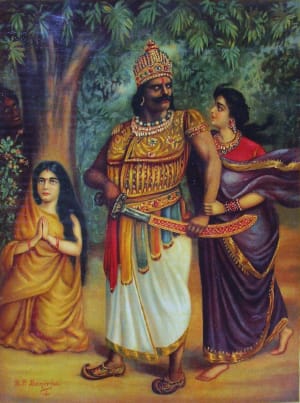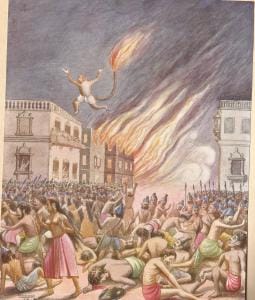Veranda Tales-Take a peek and come right back

Storytelling has been an integral part of my life since childhood. I grew up listening to stories during the hot summer evenings and nights with my cousins. Mothers and grandmothers would gather all of us children for story time. It was usually pitch dark except for a very faint light coming from the flickering candle. Power cuts were as frequent as the hot and humid summer days. We all spread out on a cool concrete floor or bamboo mats on the veranda intently listening to fascinating stories about kings, queens, princes, princesses, and peasants alike. Stories about love, life, families, and people entertained and taught us life skills. These stories transported us to distant worlds, strange yet familiar. Often the same story told by two people sounded different as storytellers added new twists and turns adding their personal style and flair to the stories.
Storytelling wasn’t limited to summer evenings and bedtime. I was surrounded by adults who didn’t pass up an opportunity to share their wisdom using the art of storytelling. These rich vibrant oral traditions include songs, poems, stories, and సామెతలు (Sametalu are proverbs in Telugu). Men and women sing songs as they work in the fields, grinding grains and spices and doing other daily chores at their homes. Stories are often used to teach important life lessons, interpersonal skills, and survival skills. These stories and the time spent listening to them made our lives richer leaving an impression on me. This series is all about reliving those memories as I share these stories.
చూసి రమ్మంటే కాల్చి వచ్చినట్టు (choosi rammante kaalchi vachinatlu)
It was common for me to run errands and do chores when I was growing up. అమ్మ (Amma is mother Telugu) was too afraid of me getting hurt while cooking and didn’t teach me the cooking skills. However, she didn’t hesitate to send me to a nearby post office to mail letters and get stamps. She would send me out to our neighborhood butcher shop to get meat, and to our local poultry market to get eggs, and chicken. She would send me to our corner medical store to get bread and medicine and to a government ration store to get our monthly rations. One of my aunts teases అమ్మ (Amma) even to this day that she raised me like a son.
నాన్న (Nanna) would send me to get movie and train tickets. I used to go to the train station to book tickets for my return trips to college. These were the days when buying train tickets required walking to the train station, standing in line to get to the ticket counter to secure tickets for an upcoming train trip.
when I came back with something she didn’t ask for, but badly needed it. అమ్మ (Amma) with a smile on her face say, “చూసి రమ్మంటే కాల్చి వచ్చినట్టు (choosi rammante kaalchi vachinatlu)”. It is her way of saying, “great job”. నాన్న (Nanna) used this sameta more sparingly reserving it for bigger achievements like acing a Math or English test. The meaning of this sameta is, “When asked to go see and come back, see, burn, and come back”.
This Telugu sameta is used to describe someone who goes above and beyond what is asked of them. It is also used to show appreciation when someone does more than what they are asked or expected to accomplish or achieve.
This sameta has its origins in the Indian epic, రామాయణం (Ramayana) which was composed in the 3rd century BCE. Another Greek epic, Iliad, was composed in the 8th century BCE. These two epics share a common thread centered around kings rescuing wives. Menelaus brings back his eloped wife, Helen of Troy who eloped with Paris. రామ (Rama) rescues his abducted wife, సీత (Sita) from రావణ (Ravana).
సీత (Sita) was abducted by రావణ (Ravana) who pretended to be a సాధు (sadhu is mendicant in Telugu) while she was living in exile with her husband, రామ (Rama) and his brother, లక్ష్మణ (Lakshamana). Menelaus and రామ (Rama) assemble a collection of friends and allies from neighboring kingdoms. They go to battle to defeat their respective enemies and get their wives back.
In the epic రామాయణం (Ramayana), రావణ (Ravana) holds సీత (Sita) captive in his capital Lanka. He pressures her to consent to become his wife, as సీత (Sita) steadfastly refuses to marry రావణ (Ravana) despite repeated threats of death from him. His queen consort, మండోదరి (Mandodari) repeatedly stops him from slaying సీత (Sita) advising him to follow the path of ధర్మ (dharma) and return సీత (Sita) to reunite with రామ (Rama). ధర్మ (dharma) is path of righteousness in Telugu). రామాయణం (Ramayana) depicts her as a woman of great beauty and intelligence who was loyal to her husband రావణ (Ravana) knowing and understanding his greatness and faults. She tried to save him from the consequences of his actions with her timely advice.

రామ (Rama) forms alliances with neighboring kings for the epic battle with రావణ (Ravana). It is no small task to defeat powerful రావణ (Ravana). He sends his devoted companion and ally, ఆంజనేయ (Aanjaneya) aka హనుమాన్ (Hanuman) on a reconnaissance mission to locate సీత (Sita), talk to her to put her mind at ease, and estimate the strength of his opponent.
ఆంజనేయ (Aanjaneya) has the power to change his size. He makes himself very big to cross the ocean to reach Lanka by simply taking one step and shrinks himself to a small size to search the capital for సీత (Sita). He finds her sitting under a tree in a grove surrounded by రావణ (Ravana)’s guards. He waits for the guards to fall asleep at night to speak to సీత (Sita). He offers to rescue her by carrying her on his back. When she refuses, saying she wants her husband to come save her after defeating రావణ (Ravana). ఆంజనేయ (Aanjaneya) assures సీత (Sita) that రామ (Rama) is on his way to rescue her.
He then starts destroying the grove, gets captured by the guards and ends up in రావణ (Ravana)’s court. He delivers రావణ (Ravana) the message from రామ (Rama) that he is on his way to rescue his wife, సీత (Sita). రావణ (Ravana) laughs at the little monkey standing in front of him and orders his guards to kill him. మండోదరి (Mandodari) cautions him against harming the messenger. He then asks his guards to release ఆంజనేయ (Aanjaneya) after lighting his tail on fire instead of killing him. As the story goes, ఆంజనేయ (Aanjaneya) hops from building to building setting fire to them thereby burning the capital as he leaves the capital after his release.
చూసి రమ్మంటే కాల్చి వచ్చినట్టు (choosi rammante kaalchi vachinatlu) sameta describes ఆంజనేయ (Aanjaneya)’s act of burning the city when రామ (Rama) sent him to just locate సీత (Sita) and come back. He caused a lot of damage to the capital ahead of the war which would prove to be vital for the success.
Understanding this sameta requires the cultural context of the epic and the important role ఆంజనేయ (Aanjaneya) plays in finding సీత (Sita), brining the good news back to రామ (Rama), and single handedly weakening the enemy by burning the capital.
This sameta brings back memories from my childhood errand runs. I remember this sameta when I come back from a shopping trip setting out to buy just milk and come back with shopping bags full of things we need. We all have occasions where we go on a vacation to see places and we find opportunities to visit more places than we originally planned.
This sameta is apt to use on such occasions to enjoy our achievements to the fullest with the image of ఆంజనేయ (Aanjaneya) hopping from building to building with his tail on fire and smile on his face. We can visualize him reaching the ocean and putting the fire out by taking a dip in the ocean.
On a recent trip to India, అమ్మ (Amma) asked me to bring sweets to distribute to everybody who lives at her senior care place. I stopped by a sweets place on my way to her place and chanced upon finding freshly made బొబ్బట్లు (bobbatlu) for a total of 100 residents and staff. The store owner packaged them individually so they were ready to serve. When I walked into her room with a large box full of piping hot బొబ్బట్లు (bobbatlu), అమ్మ (Amma) said, చూసి రమ్మంటే కాల్చి వచ్చినట్టు (choosi rammante kaalchi vachinatlu)” with a beaming smile on her face. I felt like a proud teenager once again.

